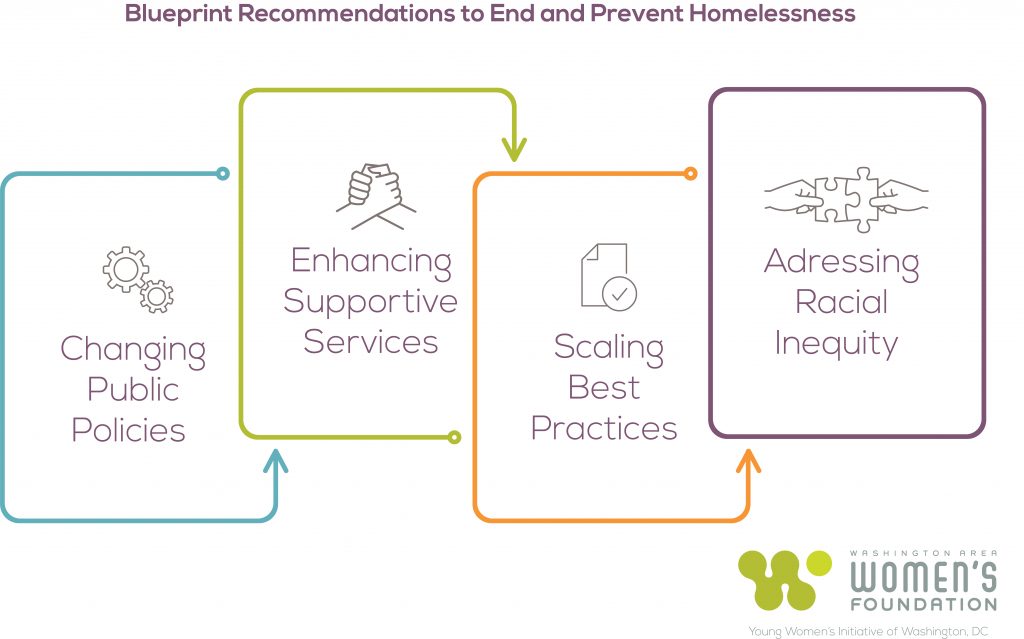This post is the first of a two part-series focused on philanthropy’s role in ending homelessness in collaboration with Funders Together to End Homelessness.
On a given night, close to 7,000 people are living in shelters or on the streets in the District of Columbia. Many more are at high risk of experiencing homelessness, dependent upon others for temporary accommodation, or living one crisis away from housing instability.
Many factors can contribute to individuals and families experiencing homelessness such as job loss, family breakdown, eviction, and domestic violence. However, the root cause of homelessness is the lack of affordable housing and the failure of systems, not that of an individual, and is perpetuated by the historical and current structural racism that exists in those systems.
Young women of color who provided their time and expertise to shape our Blueprint for Action—the policy agenda of the Young Women’s Initiative—talked about experiencing homelessness and lacking access to affordable housing. Homelessness came up in every single policy issue we discussed, from education, to health and well-being, to the juvenile justice system and economic security. They recognized that without housing first, it is hard for young women of color to pursue personal goals, secure and maintain employment, and overall improve the quality of their life.
Based on the learnings and overarching recommendations of the Blueprint for Action, and the work many funders and non-profit organizations are doing in the Washington region to end homelessness, this post outlines four funding strategies to prevent and end youth homelessness in the District of Columbia.
Because homelessness is complex and happens at different levels, our recommendations focus not only on strategies that drive individual programs to success but also on systemic approaches to address the underlying causes.
Addressing Racial Inequity
Young women of color are overrepresented among the youth population experiencing homelessness and structural racism within larger systems perpetuate these disparities. By centering the communities most affected by racism and helping a wide range of stakeholders to understand the harms of implicit racial biases and racist policies, philanthropy can help dismantle one of the root causes of homelessness, advance opportunities for all, and achieve equitable systems. Philanthropy also has the opportunity to challenge and lead the field in ensuring policies and practices are actively anti-racist in their creation and implementation. If the solutions we advance are working under a “colorblind” approach, we will never achieve racial equity and instead perpetuate racial injustices.
Scaling Best Practices
Understanding the realities of young women of color experiencing homelessness and the extent to which gender, culture, trauma, age, gender identify, and sexual orientation, among other factors, shape these experiences is indispensable to help them move out of homelessness. Supporting programs and solutions that center the young women of color with lived expertise, recognize the solution’s unique strengths and barriers and then build on these strengths, is an effective way to scale best practices.
Enhancing Supportive Services
Supporting organizations that increase access to housing options and coordinated supportive services for young women of color experiencing homelessness makes a significant difference in young women’s ability to work to regain stability and to reduce the contributing factors that caused them to experiencing homelessness in the first place. Strong and coordinated support services that connect young women of color to the most appropriate level and type of assistance based on their strengths and needs is a critical first step to prevent and end homelessness.
Changing Public Policies
Supporting advocates and organizations working to end homelessness in our region to advance policies that directly affect people experiencing homelessness is one of the most powerful ways to create long-term, sustainable change. Through public-private partnerships, philanthropy’s engagement in advocacy and public policy efforts leverages the impact of available resources and is an effective strategy to bring about systemic change. Funders can support efforts through not only funding grassroots organizations, but also through their influence and use of voice to lift up or oppose policies that impact housing and homelessness programs.
Claudia Williams is Program Officer at Washington Area Women’s Foundation where she contributes to crafting and executing program strategy and manages the Young Women’s Initiative of Washington, DC.




